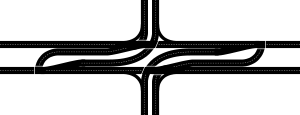Superstreet

A superstreet, also known as a restricted crossing U-turn (RCUT), J-turn,[1] or Reduced Conflict Intersection,[2] is a type of road intersection that is a variation of the Michigan left. In this configuration, traffic on the minor road is not permitted to proceed straight across the major road or highway. Drivers wishing to turn left or go straight must turn right onto the major road, then, a short distance away, queue (wait) into a designated U-turn (or crossover) lane in the median. When traffic clears, they complete the U-turn and then either go straight or make a right turn when they intersect the other half of the minor road.
The superstreet typically requires four traffic light-controlled intersections, and most traffic must pass through two of them, but each light has only two phases, greatly increasing average traffic flow; there is no need for numerous left-turn phases where most traffic is waiting for only a few cars to clear the intersection. Turning movements on roads with lower cross-traffic volumes may be controlled with stop or yield signs for turning traffic rather than with signals.
Practicality
Superstreets are not very common because they require substantial Right of Way to provide a median that can accommodate truck traffic. Inconvenience to traffic on the minor road is mostly a perception issue and does not represent additional delay in most cases. However, superstreets are cheaper to construct than limited access freeways with interchanges and improve the flow of traffic on the major road.
Usage
In North Carolina, five superstreet intersections were included as a part of U.S. Route 17's recent upgrades near Wilmington, North Carolina (34°12′58″N 78°01′08″W / 34.21603°N 78.018969°W). There are also three superstreet intersections in Holly Springs along the NC 55 bypass.[3]
In Texas in 2010, several intersections on US 281 were converted to superstreet in the northern San Antonio neighborhood of Stone Oak, north of Loop 1604, to relieve rush hour congestion.[4][5][6] In northwest San Antonio in 2011, two intersections on Loop 1604, north of State Highway 151, were converted to superstreet.[7][8] In Austin, a superstreet is being phased in starting February 19, 2013, at the intersection of SH 71 and Farm to Market Road 973 east of Austin-Bergstrom International Airport not far from the eastern boundary of the Austin city limits. This becomes the city of Austin's first superstreet and the second city in Texas to feature this intersection design.[9]
Troy, Michigan has a superstreet on West Big Beaver Road at Lakeview Drive. 42°33′41″N 83°10′53″W / 42.561383°N 83.181310°W
Benefits
A study showed a 20 percent overall reduction in travel time compared to similar intersections that use conventional traffic designs; intersections experience an average of 46 percent fewer reported automobile collisions – and 63 percent fewer collisions that result in personal injury.[10]
See also
References
- ↑ Staff (October 2009). "Restricted Crossing U-Turn Intersection (FHWA-HRT-09-059)". Alternative Intersections/Interchanges: Information Report (AIIR) (FHWA-HRT-09-060). Federal Highway Administration. Retrieved August 24, 2012.
- ↑ Minnesota Department of Transportation, Reduced Conflict Intersections, accessed November 2014
- ↑ Kenney, Andrew. "Traffic rolls onto new Holly Springs superstreet". News & Observer. Retrieved 3 December 2013.
- ↑ New, Brian (March 11, 2010). "Super street construction on US 281 to begin on Monday". KENS. Retrieved March 23, 2013.
- ↑ "US281 Superstreet". 4-1-1 on 281. Alamo Regional Mobility Authority. Retrieved March 23, 2013.
- ↑ "Loop 360 - Archive: Innovative Intersections: The Superstreet (RCUT)". Texas Department of Transportation. Retrieved March 23, 2013.
- ↑ "Loop 1604 Super Street". Alamo Regional Mobility Authority. Retrieved March 23, 2013.
- ↑ "Loop 1604 superstreet promises easier flow". KENS. September 15, 2011. Retrieved March 23, 2013.
- ↑ "Super street coming to East Austin". Austin, TX: KVUE-TV. February 19, 2013. Retrieved February 19, 2013.
- ↑ PhysOrg: No left turn: 'Superstreet' traffic design improves travel time, safety
External links
- Federal Highway Administration, Alternative Intersection Treatments - Super-street Median Crossover
- Federal Highway Administration, Restricted Crossing U-Turn Intersection Informational Guide
- North Carolina DOT - proposed superstreet in Chapel Hill (note: this project does not include the left turns from the main road)
- Brunswick Beacon article Superstreet considered for U.S. 17
- Information on two superstreets in San Antonio, including detailed illustrations of the various traffic flows.
- FHWA: RCUT Case Study – Bypass 55 Corridor in Holly Springs (North Carolina), published July 31, 2014
